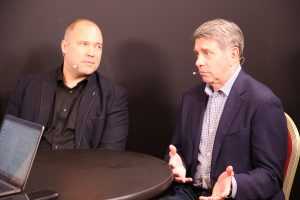Radical Transparency and Fourstalking
![]() I’ve been playing with my new Windows Mobile phone I got as a gift from my wife last week (more on that later, suffice it to say that I love this thing), and a feature that’s new for me is having GPS on a mobile device. The phone I was using up until a couple weeks ago I affectionately dubbed my “crapbox” phone, which is a sturdy but relatively featureless and dumb phone that’s about as old as my youngest son, and has survived far more abuse from him than it should.
I’ve been playing with my new Windows Mobile phone I got as a gift from my wife last week (more on that later, suffice it to say that I love this thing), and a feature that’s new for me is having GPS on a mobile device. The phone I was using up until a couple weeks ago I affectionately dubbed my “crapbox” phone, which is a sturdy but relatively featureless and dumb phone that’s about as old as my youngest son, and has survived far more abuse from him than it should.
I leave the house about once or twice a day, generally for no more than a half hour (because I am, after all, a fairly sedentary and workaholic blogger). As such, I didn’t see a whole lot of harm putting up a Google Lattitude widget on my personal blog. Most of the time, it’s going to show which side of the couch I’m sitting on, and 5% of the time it might be actually useful when I go out on a business trip.
That isn’t the case for most people. Radical transparency is something generally reserved for people like me with nothing radical to be transparent about (and of course, Jeff Jarvis).
I hadn’t seen that fact more clearly demonstrated than earlier today in a post over at Lalawag entitled “Fourscared and Fourscammed.”
Ten minutes after checking in on Foursquare at the Loteria Grill one chilly night in February, Gim received a phone call from someone at the restaurant’s front desk. When she picked up the phone, the caller asked her what she was doing there and told her he’d be waiting for her at her apartment. Gim didn’t go home that night.
“I was on a date, but because he was a new person I sort of felt weird and just said I had to leave,” shared Gim. “Then I walked next door to Geisha house, called a friend and I stayed at her place. I was kind of freaked out.”
The same thing happened to Jeana Arter and Austin Passy. When someone called for him at the Coral Tree, he told the restaurant to ignore the caller. However, when someone phoned him a second time at a different venue, Prasad picked up and was told someone would be waiting for him at his house later.
The author has had her share of problems, too:
…an unknown number showed up on my iPhone. I normally only answer calls from numbers I recognize, but I picked up anyway. The caller asked me why I hadn’t been to Runyon Canyon lately. Back when I lived in West Hollywood, I hiked in Runyon Canyon Park two hours a day and I checked in regularly. When I asked who was calling he hung up. Turns out Foursquare makes your cell phone number visible to anyone you befriend on the Foursquare.
![]() There are several other anecdotes reported in the post, and since I’ve started writing about it here, it’s hit the top of Digg in the popular category. This is clearly an issue that resonates with people, and it surprises me that this doesn’t get as much attention amongst the early adopters as the supposed privacy issues with Google Buzz.
There are several other anecdotes reported in the post, and since I’ve started writing about it here, it’s hit the top of Digg in the popular category. This is clearly an issue that resonates with people, and it surprises me that this doesn’t get as much attention amongst the early adopters as the supposed privacy issues with Google Buzz.
How much of this is people playing pranks on those with overactive imaginations and how much of it is actual stalking? So far, I haven’t heard any stories from those actually negatively affected by the use of location based social networks (aside from the odd story of a robbery here and there, that may or may not be connected to oversharing). Certainly it’s both very early on for there to be a lot of stories of that variety, and all these instances are proof of concepts for this sort of scary attack.
If there’s one thing I learned from doing a year and a half of the “social media crime blotter” over at Mashable, though, it’s that criminals are typically very stupid. Typically, an online crime is committed via ignorance of how technology works, rather than through superior knowledge of technology.
Take, for instance, this nerd-on-nerd crime from December of 2007:
A Whitehall, Michigan teen is facing a potential 10 year felony assault jail sentence for attacking a 15-year-old student at Whitehall High School. Both boys were bloggers, and 17-year-old Gabriel Cerchiori allegedly attacked from behind the unnamed 15-year-old victim after a derogatory comment was posted regarding a mutual deceased friend.
Or this chestnut you may remember from around the same time:
Apparently the kids at Penn State were hard up Halloween costume ideas this year, so they grabbed a couple of Virginia Tech t-shirts, ripped some holes in them and stained them with fake blood.
Instant party, right? It doesn’t stop there. The images were posted to Facebook, and somehow Matt Drudge got a hold of them. Now, there appears to be a Facebook flamewar going back and forth between Penn State and Virginia Tech that has escalated to the level of death threats. From one of the Penn State students who wore the costume:
“This is a group of college students who now think it’s trendy to be upset about their friends being killed,” one of the two Penn State students who wore the costume said. “I don’t know what they teach people in Virginia Tech, but at Penn State we don’t learn to threaten people with murder to teach them that murdering is wrong.”
In those and most other cases, crime involving technology looks less like what we see on CSI, and more like, well, reality. In the real life, most people aren’t computer geniuses, and those that aren’t smart enough to come up with legitimate ways to make money or accomplish their goals are even less likely to execute the perfect online crime.
That will certainly change at some point between now and the perfect world that Gowalla and Foursquare see where their tools are adopted by everyone. In the mean time, I think we can cross this off our list of things to worry about while they work on fixing the privacy controls.
A message from John Furrier, co-founder of SiliconANGLE:
Your vote of support is important to us and it helps us keep the content FREE.
One click below supports our mission to provide free, deep, and relevant content.
Join our community on YouTube
Join the community that includes more than 15,000 #CubeAlumni experts, including Amazon.com CEO Andy Jassy, Dell Technologies founder and CEO Michael Dell, Intel CEO Pat Gelsinger, and many more luminaries and experts.
THANK YOU









